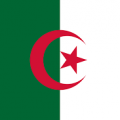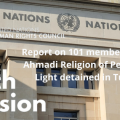Denial of asylum, violence, and deportation amid rising religious persecution
CAP LC and Human Rights Without Frontiers would like to raise to the Council’s attention the urgent crisis of 104 members of the religion in Turkey, who are at risk of facing death sentences and imprisonment because Turkish authorities have decided to deport them back to their home countries, where they are facing extreme forms of religious persecution.
Denial of asylum, violence, and deportation amid rising religious persecution:
On the 24th of May, 2023, over 100 members of The Ahmadi Religion of Peace and Light, a persecuted religious minority, presented themselves at the Turkish-Bulgarian border to legally lodge a claim for asylum with the Bulgarian Border Police. They were denied entry and faced violent treatment by the Turkish authorities, assaulting, kicking, and beating them with batons and firing gunshots in the air. Women, children, and elderly people were among those subjected to aggression. The Turkish authorities then detained them and proceeded to transfer them to the Edirne detention center, where 104 deportation orders were issued against them, posing a tremendous risk to their lives and safety. Many of them, especially in Iran, will face imprisonment and may be executed if they are sent back to their country of origin.
The events of violence at the border were captured on camera and appeared on live TV as the Ahmadi religion was broadcasting on their satellite channel. The case was also raised as an emergency situation by numerous media outlets all across Europe.
State sponsored persecution
Since its inception in 1999, the Ahmadi Religion of Peace and Light minority has been subjected to persecution in numerous Muslim-majority nations. Countries including Algeria, Morocco, Egypt, Iran, Iraq, Malaysia, and Turkey have systematically oppressed them, imprisoned, threatened, and even tortured their members. This targeted discrimination stems from labeling them as heretics.
In June 2022, Amnesty International called for the release of 21 members of the Ahmadi religion in Algeria who were charged with offenses including “participation in an unauthorized group” and “denigrating Islam.” Three individuals received one year prison sentences, while the remaining were sentenced to six months in prison along with fines.
Similarly, in Iran, in December 2022, a group of 15 Ahmadi Religion of Peace and Light followers, including minors and women, were detained and transferred to the notorious Evin Prison, where they were coerced to denounce their faith and defame their religion, despite not committing any crimes, nor preaching their faith openly. The charges brought against them were based on their opposition to “Wilayat Al Faqih” (the guardianship of the Islamic jurist) which grants authority to jurists and scholars who shape and enforce Sharia law in the country. The Iranian authorities even aired a propaganda documentary against The Ahmadi Religion of Peace and Light on national television.
Members of this faith have also reported violence and threats by state-sponsored militias, leaving them vulnerable and unprotected. These incidents involved armed attacks targeting their homes and vehicles, with assailants openly declaring they are considered apostates deserving death, effectively denying them of any form of protection.
The persecution of the Ahmadi religion of Peace and Light stems from its core teachings that challenge certain traditional beliefs within Islam. These teachings include the acceptance of practices such as consuming alcoholic beverages, embracing and showing tolerance towards LGBTQ individuals, and recognizing the choice of women regarding the wearing of the headscarf. Additionally, members of the religion question specific prayer rituals, including the notion of mandatory five daily prayers, and hold the belief that the month of fasting (Ramadan) falls in December each year. They also challenge the traditional location of the Kaaba, Islam’s holiest site, asserting it is in modern-day Petra, Jordan, rather than Mecca.
The persecution of members of the Ahmadi Religion of Peace and Light has escalated dramatically following the publication of the official gospel of the religion, “The Goal of the Wise” authored by the head of the religion, Abdullah Hashem Aba Al-Sadiq, whom members of the religion follow and consider to be the Riser of the Family of Mohammed and the awaited Mahdi.
No safe haven for members of the religion in any Muslim-majority country
With the surge in violent attacks and persecution after the release of the official gospel, many members of the group decided to flee their home countries and pursue their right to seek protection and freedom to practice their religion. They traveled to Turkey as it was the fastest country they could enter legally. Yet they do not feel safe to lodge an application for international protection in Turkey due to the consistently documented violations of religious freedoms, including the criminalisation of blasphemy or expressions deemed insulting to religious beliefs. Although Turkey is a secular country, President Erdoğan has close ties to the Muslim Brotherhood and, In fact, a 2022 report from the European Parliament warns that, in Turkey, religious minorities face “sustained legal and administrative pressure”. Furthermore, the criminalisation of blasphemy under Article 216(3) of the Turkish Penal Code shrinks any space for views that are different to the country’s mainly practised Sunni Islam. In fact, Turkish singer Sezen Aksu received massive backlash for lyrics that describe Adam and Eve, considered holy figures in Islam, as ‘ignorant’, with President Erdoğan promising to “rip out the tongues” of those who insult religious figures. This event has been pointed out by the Ahmadi group as one reason for their fear that their beliefs would be persecuted and considered ‘heretical’ in Turkey.
In light of this, the group do not feel safe to lodge their applications for international protection in Turkey as they fear they will be faced with similar persecution to that which they have fled in their own countries. As a result, they have tried to seek legal pathways to Bulgaria and have contacted the UNHCR in Bulgaria, the State Agency for Refugees (SAR), and even the Ministry of Foreign Affairs to request a visa on humanitarian grounds. All these efforts have been unsuccessful.
The group decided to gather at the official Kapikule border crossing, the gateway between Turkey and Bulgaria on Wednesday, May 24, 2023, to request asylum directly from the Bulgarian Border Police. Their course of action aligns with the provisions set forth in Article 58(4) of the Law on Asylum and Refugees (LAR) which affirms that asylum can be sought by presenting a verbal statement to the border police.
The Border Violence Monitoring Network, along with 28 other organizations, issued an open letter urging the Bulgarian authorities and the European Border and Coast Guard Agency (Frontex) to fulfill their obligations under European Union law, and international human rights law. These laws include Article 18 of the EU Charter of Fundamental Rights, the 1951 Geneva Convention Relating to the Status of Refugees, and Article 14 of the Universal Declaration of Human Rights.
The group’s adherence to Bulgarian authorities’ instructions for asylum seekers to always approach designated border crossing points and refrain from illegal routes was encountered with oppression and violence, raising doubts about available legal pathways for asylum seekers to lodge their claim for asylum. They were punished that day for following the law, at the same time the incident showed clearly that asylum seekers are left with no other option but dangerous smuggler routes to apply for asylum.
Conclusion and Recommendations:
The deportation of the Ahmadi Religion of Peace and Light members means immediate death sentences for many of them, especially in Iran, or imprisonment for a very long time. At the same time, remaining in Turkey is very dangerous for them, acts of persecution by the state, or acts of violence by fundamentalist non-state actors are expected.
CAP LC and Human Rights Without Frontiers, therefore, urges the UN:
- to urge Turkey to immediately annul all deportation orders for the 104 Ahmadi Religion members. Deporting these families would be a clear violation on Türkiye’s behalf of the core principle of non-refoulement, which prohibits returning individuals to a country where they would face torture, cruel, inhuman, or degrading treatment or punishment, and other irreparable harm.
● To grant the 104 Ahmadi religion members asylum in a safer land outside of Turkey where they can safely lodge their claims for asylum and practice their faith freely and peacefully.
g2322949 HRC 53 Ahmadiyya Turquie






